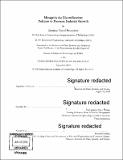Minigrids for electrification : policies to promote industry growth
Author(s)
Brusnahan, Matthew Daniel.
Download1110577884-MIT.pdf (14.96Mb)
Other Contributors
Massachusetts Institute of Technology. Institute for Data, Systems, and Society.
Massachusetts Institute of Technology. Engineering Systems Division.
Technology and Policy Program.
Advisor
Jose Ignacio Pérez-Arriaga.
Terms of use
Metadata
Show full item recordAbstract
The International Energy Agency estimates $331 billion dollars will be invested over the next 12 years to provide energy access to the 1.1 billion people who currently lack access to reliable electricity service. Of the $331 billion, the IEA estimates that 34% of this capital will be directed towards minigrid systems. In line with these capital estimates, governments in many countries with low levels of electricity service are undertaking significant capital expenditures in order to expand the existing electricity infrastructure. However, this capital is limited and will not be sufficient to provide universal access. One proposed solution to overcome limited government budgets and capacity is to allow off-grid and minigrid services in areas which will not be reached by government-led programs. This thesis utilizes a computer-based simulation model to explore how minigrid developers respond to commercial, industrial, and residential customers and the type of service these minigrid developers may choose to provide to these customers. The effect of government policies and subsidies is incorporated into the developed simulation model to judge the effect of these policies on firm behavior. The simulation results find that if governments are to prioritize universal access to rural households, specific policy measures must be put in place to encourage minigrid developers to provide service to low-income consumers.
Description
Thesis: S.M. in Technology and Policy, Massachusetts Institute of Technology, School of Engineering, Institute for Data, Systems, and Society, 2018 Cataloged from PDF version of thesis. Includes bibliographical references (pages 63-65).
Date issued
2018Department
Massachusetts Institute of Technology. Institute for Data, Systems, and Society; Massachusetts Institute of Technology. Engineering Systems Division; Technology and Policy ProgramPublisher
Massachusetts Institute of Technology
Keywords
Institute for Data, Systems, and Society., Engineering Systems Division., Technology and Policy Program.